8 books about Rowe, John Carlos
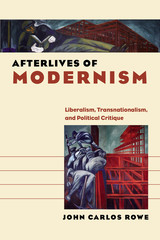
Afterlives of Modernism
Liberalism, Transnationalism, and Political Critique
John Carlos Rowe
Dartmouth College Press, 2015
In times of liberal despair it helps to have someone like John Carlos Rowe put things into perspective, in this case, with a collection of essays that asks the question, “Must we throw out liberalism’s successes with the neoliberal bathwater?” Rowe first lays out a genealogy of early twentieth-century modernists, such as Gertrude Stein, John Dos Passos, William Faulkner, and Ralph Ellison, with an eye toward stressing their transnationally engaged liberalism and their efforts to introduce into the literary avant-garde the concerns of politically marginalized groups, whether defined by race, class, or gender. The second part of the volume includes essays on the works of Harper Lee, Thomas Berger, Louise Erdrich, and Philip Roth, emphasizing the continuity of efforts to represent domestic political and social concerns. While critical of the increasingly conservative tone of the neoliberalism of the past quarter-century, Rowe rescues the value of liberalism’s sympathetic and socially engaged intent, even as he criticizes modern liberalism’s inability to work transnationally.
[more]
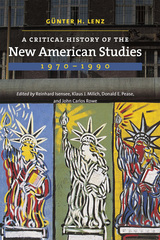
A Critical History of the New American Studies, 1970–1990
Günter H. Lenz
Dartmouth College Press, 2016
Starting in 2005, Günter H. Lenz began preparing a book-length exploration of the transformation of the field of American Studies in the crucial years between 1970 and 1990. As a commentator on, contributor to, and participant in the intellectual and institutional changes in his field, Lenz was well situated to offer a comprehensive and balanced interpretation of that seminal era. Building on essays he wrote while these changes were ongoing, he shows how the revolution in theory, the emergence of postmodern socioeconomic conditions, the increasing globalization of everyday life, and postcolonial responses to continuing and new forms of colonial domination had transformed American Studies as a discipline focused on the distinctive qualities of the United States to a field encompassing the many different “Americas” in the Western Hemisphere as well as how this complex region influenced and was interpreted by the rest of the world. In tracking the shift of American Studies from its exceptionalist bias to its unmanageable global responsibilities, Lenz shows the crucial roles played by the 1930s’ Left in the U.S., the Frankfurt School in Germany and elsewhere between 1930 and 1960, Continental post-structuralism, neo-Marxism, and post-colonialism. Lenz’s friends and colleagues, now his editors, present here his final backward glance at a critical period in American Studies and the birth of the Transnational.
[more]

The Cultural Politics of the New American Studies
John Carlos Rowe
Michigan Publishing Services, 2012
In The Cultural Politics of the New American Studies, leading American Studies scholar John Carlos Rowe responds to two urgent questions for intellectuals. First, how did neoliberal ideology use the issues of feminism, gay rights, multiculturalism, transnationalism and globalization, class mobility, religious freedom, and freedom of speech and cultural expression to justify a new “American Exceptionalism,” designed to support U.S. economic, political, military, and cultural expansion around the world in the past two decades?
Second, if neoliberalism has successfully employed various cultural media, then what are the best means of criticizing its main claims and fundamental purposes? Is it possible under these circumstances to imagine a “counter-culture” which might effectively challenge neoliberalism or is such an alternative already controlled and contained by such labels as “political correctness,” “the far left,” “radicalism,” “extremism,” even “terrorism,” which in the popular imagination refer to political and social minorities, doomed thereby to marginalization?
Rowe argues that the tradition of “cultural criticism” advocated by influential public intellectuals like Edward Said can be adapted to the new circumstances demanded by the hegemony of neoliberalism and its successful command of new media. Yet rather than simply honoring important predecessors such as Said, we need to reconceive the role of the public intellectual as more than just an “interdisciplinary scholar” but also as a social critic able to negotiate the different media.
Second, if neoliberalism has successfully employed various cultural media, then what are the best means of criticizing its main claims and fundamental purposes? Is it possible under these circumstances to imagine a “counter-culture” which might effectively challenge neoliberalism or is such an alternative already controlled and contained by such labels as “political correctness,” “the far left,” “radicalism,” “extremism,” even “terrorism,” which in the popular imagination refer to political and social minorities, doomed thereby to marginalization?
Rowe argues that the tradition of “cultural criticism” advocated by influential public intellectuals like Edward Said can be adapted to the new circumstances demanded by the hegemony of neoliberalism and its successful command of new media. Yet rather than simply honoring important predecessors such as Said, we need to reconceive the role of the public intellectual as more than just an “interdisciplinary scholar” but also as a social critic able to negotiate the different media.
[more]

New American Studies
John Carlos Rowe
University of Minnesota Press, 2002
A clarion call for a more theoretically and politically informed approach to American Studies.
John Carlos Rowe, a leading American Studies scholar, has examined his field of study and declared it not ready for the twenty-first century. In The New American Studies, Rowe demands a reinvention of the discipline that includes a commitment to making it more theoretically informed, and he draws on the work of cultural critics, postmodernist theorists, and scholars in ethnic, gender, gay, and media studies. Rowe asserts that with American Studies' strong history of social criticism and practical pedagogy it is an easy leap to the type of progressive commitments characteristic of these areas of scholarship.
The New American Studies is a compelling combination of theory and application, synthesis and polemic. Rowe traces the evolution of American Studies over the last quarter century and looks to the future, placing the field in a postnationalist context that encompasses all of the Americas and the disparate cultural zones within. He then demonstrates the kind of literary and cultural interpretation he calls for, examining subjects ranging from Hawthorne's and James's responses to nineteenth-century sexual mores, to the ways television legitimated itself in its first few decades, to the Elián González custody case.
John Carlos Rowe is professor of English at the University of California, Irvine.
[more]
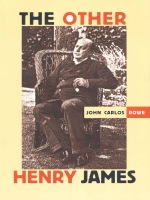
The Other Henry James
John Carlos Rowe
Duke University Press, 1998
In The Other Henry James, John Carlos Rowe offers a new vision of Henry James as a social critic whose later works can now be read as rich with homoerotic suggestiveness. Drawing from recent work in queer and feminist theory, Rowe argues that the most fruitful approach to James today is one that ignores the elitist portrait of the formalist master in favor of the writer as a vulnerable critic of his own confused and repressive historical moment.
Rowe traces a particular development in James’s work, showing how in his early writings James criticized women’s rights, same-sex relations, and other social and political trends now identified with modern culture; how he ambivalently explored these aspects of modernity in his writings of the 1880s; and, later, how he increasingly identified with such modernity in his heretofore largely ignored or marginally treated fiction of the 1890s. Building on recent scholarship that has shown James to be more anxious about gender roles, more conflicted, and more marginal a figure than previously thought, Rowe argues that James—through his treatment of women, children, and gays—indicts the values and conventions of the bourgeoisie. He shows how James confronts social changes in gender roles, sexual preferences, national affiliations, and racial and ethnic identifications in such important novels as The American, The Tragic Muse, What Maisie Knew, and In the Cage, and in such neglected short fiction as “The Last of the Valerii,” “The Death of the Lion,” and “The Middle Years.”
Positioning James’s work within an interpretive context that pits the social and political anxieties of his day against the imperatives of an aesthetic ideology, The Other Henry James will engage scholars, students, and teachers of American literature and culture, gay literature, and queer theory.
Rowe traces a particular development in James’s work, showing how in his early writings James criticized women’s rights, same-sex relations, and other social and political trends now identified with modern culture; how he ambivalently explored these aspects of modernity in his writings of the 1880s; and, later, how he increasingly identified with such modernity in his heretofore largely ignored or marginally treated fiction of the 1890s. Building on recent scholarship that has shown James to be more anxious about gender roles, more conflicted, and more marginal a figure than previously thought, Rowe argues that James—through his treatment of women, children, and gays—indicts the values and conventions of the bourgeoisie. He shows how James confronts social changes in gender roles, sexual preferences, national affiliations, and racial and ethnic identifications in such important novels as The American, The Tragic Muse, What Maisie Knew, and In the Cage, and in such neglected short fiction as “The Last of the Valerii,” “The Death of the Lion,” and “The Middle Years.”
Positioning James’s work within an interpretive context that pits the social and political anxieties of his day against the imperatives of an aesthetic ideology, The Other Henry James will engage scholars, students, and teachers of American literature and culture, gay literature, and queer theory.
[more]
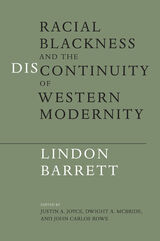
Racial Blackness and the Discontinuity of Western Modernity
Edited by Justin A. Joyce, Dwight A. McBride, and John Carlos Rowe
University of Illinois Press, 2013
The unfinished manuscript of literary and cultural theorist Lindon Barrett, this study offers a genealogy of how the development of racial blackness within the mercantile capitalist system of Euro-American colonial imperialism was constitutive of Western modernity. Masterfully connecting historical systems of racial slavery to post-Enlightenment modernity, this pathbreaking publication shows how Western modernity depended on a particular conception of racism contested by African American writers and intellectuals from the eighteenth century to the Harlem Renaissance.
[more]
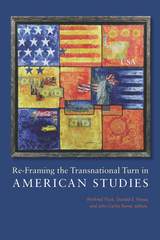
Re-Framing the Transnational Turn in American Studies
Edited by Winfried Fluck, Donald E. Pease, and John Carlos Rowe
Dartmouth College Press, 2011
This volume is the outcome of a transatlantic conversation on the topic “Transnational America,” in which more than sixty scholars from universities in the United States and Germany gathered to assess the historical significance of and examine the academic prospects for the “transnational turn” in American studies. This development has brought about the most significant re-imagining of the field since its inception. The “transnational” has subsumed competing spatial and temporal orientations to the subject and has dismantled the foundational tenets and premises informing the methodology, periodization, pedagogy, and geographical locations of U.S. American studies, but transnational American studies scholars have not yet provided a coherent portrait of their field. This volume constitutes an effort to produce this needed portrait. The editors have gathered work from a host of senior and up-and-coming Americanists to compile a field-defining project that will influence both scholars and students of American studies for many years to come.
[more]
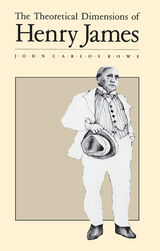
The Theoretical Dimensions of Henry James
John Carlos Rowe
University of Wisconsin Press, 1985
Rowe examines James from the perspectives of the psychology of literary influence, feminism, Marxism, psychoanalysis, literary phenomenology and impressionism, and reader-response criticism, transforming a literary monument into the telling point of intersection for modern critical theories.
[more]
READERS
Browse our collection.
PUBLISHERS
See BiblioVault's publisher services.
STUDENT SERVICES
Files for college accessibility offices.
UChicago Accessibility Resources
home | accessibility | search | about | contact us
BiblioVault ® 2001 - 2024
The University of Chicago Press









